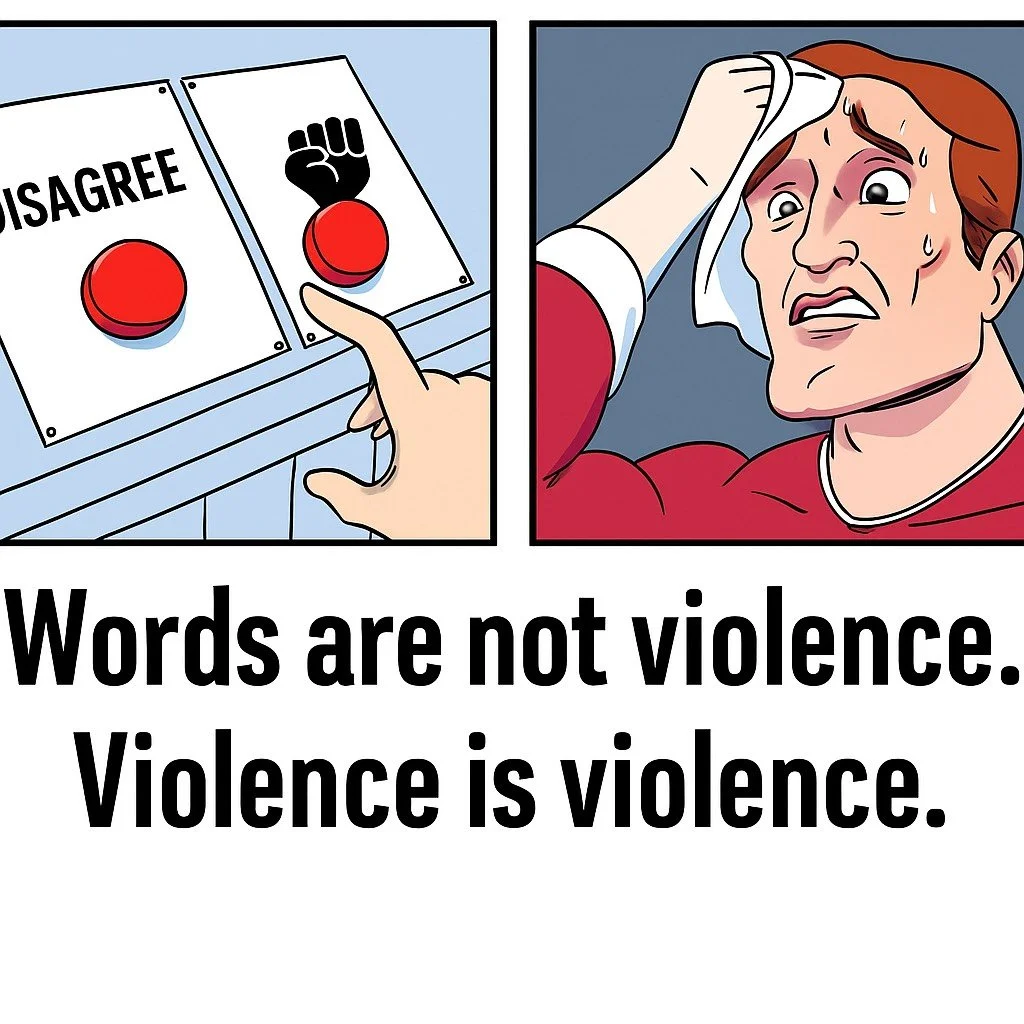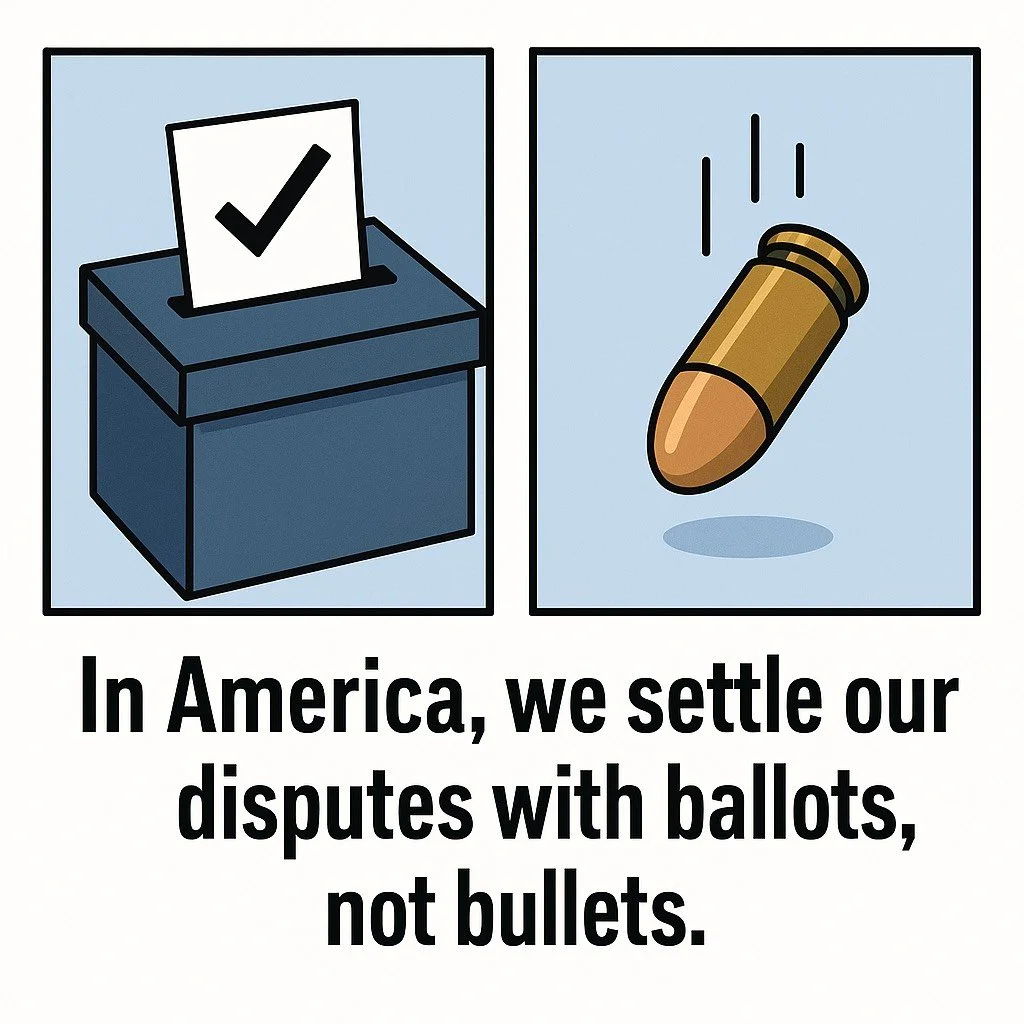The Power of Words, the Weakness of Violence
I used to be one of those “leave me alone” libertarians. My philosophy was simple: don’t bother me, and I won’t bother you. Live and let live. For years, that outlook seemed enough. I wanted less government intrusion, fewer regulations, and more space for individuals to make their own choices.
But in recent years, I’ve come to see that something deeper is at stake. The live-and-let-live approach only works if we share a culture that values restraint, dialogue, and respect for the rules of political engagement. When those values break down—when people begin to excuse violence for the sake of their cause—liberty itself is put at risk.
Extremism on both sides has created a culture where permission structures for violence are becoming normalized. And that should alarm every American, regardless of political party or ideology.
Political violence almost never erupts in isolation. It grows out of subtle permission structures—those excuses and justifications that allow people to cross the line from words to physical harm.
We’ve all seen it: a protest that starts peacefully but spirals into destruction; a heated online debate that turns into threats; a rally that ends in confrontation. Too often, the violence is downplayed, excused, or even celebrated when it serves “our side.”
That hypocrisy is dangerous. A society that excuses its own violence while condemning the other side’s soon finds itself trapped in a cycle of escalation. Once violence becomes acceptable, it doesn’t stay contained. It spreads. It corrodes civic trust. And ultimately, it threatens the very possibility of political debate.
Even Governor Gavin Newsom, someone I disagree with on many policy issues, spoke to this truth when addressing the protestors in LA this past June. He said you can be completely devoted to your political cause and honor your shared rules of political engagement. He’s right. No matter how fiercely we fight for what we believe, those shared rules—no violence, no intimidation—are what allow us to remain a self-governing people.
One of the most troubling trends in our culture today is the growing tendency to equate offensive or disagreeable words with violence. But words are not violence. Violence is violence.
This distinction is essential. Free societies thrive on open debate, passionate disagreements, and the ability to challenge one another’s views. The First Amendment was not written to protect polite conversation. It was written to protect the speech we most dislike—the disruptive, controversial, and unpopular voices.
If every sharp word is treated as an act of violence, then every disagreement becomes grounds for censorship. And if speech can be silenced in the name of safety, then freedom of thought disappears. That path leads not to peace, but to authoritarianism.
Yes, words can hurt. They can provoke, mislead, or offend. But they are still words. The proper response to speech we disagree with is more speech, not violence. That is the only way a free people can govern themselves.
When political assassinations—or attempts—occur, the immediate debate often turns to weapons. People argue about guns, about the Second Amendment, about what laws might have prevented the attack. But that misses the deeper point.
Political violence is not an attack on the Second Amendment. It is an attack on the First.
The real target of an assassin’s bullet is not just a candidate or public figure—it is the freedom of speech itself. Political violence aims to silence voices, shut down debate, and intimidate others into silence. It tells people: do not speak, do not stand, do not believe this—or else.
Guns are tools. Violence is a choice. And when violence is chosen in politics, its purpose is always to destroy speech. That is why every act of political violence is, at its core, an assault on the First Amendment.
This is why it is so troubling when people attempt to use the First Amendment as a shield to excuse violence. We sometimes hear people claim that their rhetoric is “free speech,” even when it is openly encouraging violence. Or they argue that defending violent acts is itself an exercise of free expression.
But this is a fundamental misuse of the First Amendment. Free speech is meant to advance arguments, not erase them through intimidation. A movement that relies on threats or violence is not strengthening liberty—it is undermining it.
Worse, it is sabotaging itself. No cause can sustain itself if it teaches that force is a substitute for persuasion. If you must silence your opponents with violence, you have admitted that your ideas cannot win on their own. That is not only wrong—it is self-defeating.
Violence is not an extension of political debate; it is its destruction. It is what happens when words are abandoned, when dialogue breaks down, when persuasion is replaced with force.
Political violence does not solve problems. It does not advance causes. It ends conversations. It silences voices. It replaces debate with fear.
Look at the most violent societies in the world. Do they have vibrant public discourse? Do ordinary people feel safe to speak their minds? Of course not. Violence is a muzzle. It smothers freedom.
That is why violence has no place in our politics—not because it is messy or inconvenient, but because it makes self-government impossible.
I often return to the libertarian impulse that shaped me: the desire to live freely without interference. I still believe government should be limited. But freedom without responsibility is chaos. And chaos is no friend to liberty.
The freedoms we hold dear—speech, assembly, due process, equal protection, the right to defend oneself—are not self-sustaining. They require responsibility. They require citizens who will stand up and say: no violence, no excuses.
That means condemning violence no matter who commits it or what cause they claim to serve. It means rejecting the temptation to wink at “our side’s” bad behavior while denouncing “theirs.” It means teaching the next generation that liberty requires both courage and restraint.
This is heavy stuff, but here’s why I still have hope: left or right, regardless of what “team” you play for, Americans still show up. They still vote in record numbers. They still gather in school board meetings, town halls, and city councils. They still argue—sometimes too loudly—because they care deeply about their communities and their country.
That passion matters. It means we have not given up on one another. It means that even in our disagreements, we believe this country is worth the fight. And the fact that we are still fighting with words, rather than weapons, is evidence that the core of our democratic spirit remains intact.
I have hope because ordinary Americans know instinctively that violence solves nothing. They may not always express it perfectly, but they understand that persuasion, not intimidation, is the lifeblood of liberty. And I have hope because even across partisan divides, most people want a society where their children can speak freely, vote safely, and live without fear of violence.
So what can we do? First, we can model restraint in our own lives. When arguments get heated, resist the urge to escalate. When violence occurs, condemn it immediately, regardless of who is responsible.
Second, we can teach young people that democracy depends not on force but on conversation. They need to see adults resolve disagreements without threats or intimidation. They need to learn that liberty is fragile, and it must be defended by words, not weapons.
Finally, we must demand better from our leaders. Politicians who excuse violence or fail to condemn it are unworthy of the offices they hold. Leaders set the tone, and when they fail, the public suffers.
The American experiment is built on a simple but profound idea: we resolve our disputes with ballots, not bullets. That principle is the foundation of every freedom we enjoy.
I may have started out as a “leave me alone” libertarian, but I have learned that liberty requires more than isolation. It requires courage, vigilance, and responsibility. Above all, it requires a people willing to say: no violence, no excuses.
Because in America, freedom’s survival depends not only on what is written in our laws but on what we are willing to defend in our culture. And if we fail to defend our freedoms against violence, we will soon find we no longer have them.
Left or right, whatever team you play for, that is something we can all agree on. And that shared conviction is why I still believe America’s best days are ahead.



